- Home
- Karen Hesse
Letters From Rifka Page 2
Letters From Rifka Read online
Page 2
Quickly I tucked into the shadows of the car so no one could see me. The freight car smelled warm and rich, like cattle, and I thought of Bubbe Ruth’s sweet cow Frusileh.
I write this letter to you with my good school pencil in the blank pages at the front of your Pushkin. I am writing very neat and tiny so as not to spoil the book. I hope you do not mind that I am writing in your book, Tovah, but I have no other paper. I know this letter can never reach you, but in writing to you, I feel less frightened. You have been a big sister and a best friend to me. I cannot bear to think of never talking to you again. So I will talk to you by writing about my journey.
We are heading for the Polish border. That is all I know. I cannot even speak the language. What will it be like in Poland, and beyond that, in America, where at last I will meet my three oldest brothers? I can hardly believe that I too will soon live in such a place as America.
Shalom, my little house. Shalom, my family; shalom, Berdichev, and my dear little grandmother, Bubbe Ruth. Shalom, Hannah and Aunt Anna and Uncle Avrum, but most of all Tovah,
Shalom to you,
Rifka
… And with a sword he clove my breast,
Plucked out the heart he made heat higher,
And in my stricken bosom pressed
Instead a coal of living fire … .
—Pushkin
September 3, 1919
Poland
Dear Tovah,
We were fortunate that we ran into no further trouble until we reached the Polish border. At the border, though, guards came aboard.
“Get off the train!” a squat man ordered. His round face and red cheeks did not match the sharpness of his voice.
“Get all your things out of the train! Take off your clothes. A doctor must examine you before you enter Poland.”
Can you imagine? Taking off your clothes just like that in the middle of a train yard? Tovah, doctors examine you often because of your crooked back. Is this the way they treat you?
I fought them. I would not take off my clothes for them.
“Do as I say!” the guard barked at me. “Or you will be sent back, all of you.”
From the fierceness of his voice I knew he would not hesitate to turn us over to the Russian police.
I could not have my family returned to Berdichev because of me. I took off my clothes.
I huddled beside Mama as we stood in our underwear in the waning daylight outside the boxcar. Aunt Rachel had made this underwear for me. It was white cotton and very pretty. She had made me two sets, but one was stolen from me as I swam in the Teterev this past summer.
I thought of the things the Russians had taken from my family as I stood in the train yard and I was angry. Why, Tovah? Why is it that if a Russian peasant does not get what he wants, he feels justified in stealing it from a Jew?
Papa and the boys undressed on the opposite side of the car. At least they allowed us that much privacy.
Mama and I, we had folded our clothes on top of our bags in the dry grass along the track. The guards picked up our clothes and our belongings and took them away. Even my rucksack with Mama’s candlesticks.
Before I could yell to them to bring our things back, the doctor came.
He growled at us. I could not understand his words, but he made it clear what he wanted. He ordered us to remove our underwear.
This doctor, he stank of vomit and schnapps. His breath choked my throat and I thought I would be sick. Mama did not seem to notice his stench. She smiled and nodded to him. Perhaps she feared he would send us back to Russia. Why else would she act so?
Mama helped me to remove my underwear, shielding my body with her own. Her gold locket hung between her breasts. “Keep quiet for once, Rifka,” she whispered in my ear. “Stay behind me.”
I covered my nakedness with my hands as best I could, but Mama, she acted as if stripping before the Polish doctor was no trouble, like we did this every day. She pretended this, I think, to protect me.
The doctor examined us. He took longer with Mama. I could hardly believe this brave woman was the same who wept with fear in your cellar last night. The doctor spent so much time with Mama, he hardly noticed me.
When he did turn his attention to me, the way he looked gave me gooseflesh. Tovah, you are so practical. You will say I had gooseflesh because we stood naked outside in the cold, but it was not the cold that caused me to shiver.
The doctor made me feel dirty. He looked in my eyes and my mouth and my hair. “Are you sick?” he asked me in Russian.
I kept my eyes down. I could not stand to look at him. I stared instead at my toes curled tight in the stones at the edge of the tracks. I prayed the doctor would just go away.
He yelled at me, something in Polish. Mama spoke with him.
Then she took my hand and led me into a small building. In the building, a woman sprayed us with something vile. It burned my skin and my scalp, my nose and my eyes.
Finally the Polish guards allowed us back onto the train. They returned our clothes to us and our bags, stinking of fumigation. My eyes watered from the stench of it.
That was not the worst, though. When I lifted my rucksack, it was not as heavy as it had been before. I searched the entire bag, emptying it out on the floor of the train, but Mama’s candlesticks were gone.
“So they stole our candlesticks,” Mama said. “It could be worse, Rifka, much worse. Stop sniffling and finish getting dressed.”
We pulled our clothes back on before Papa and Nathan and Saul joined us. Mama sighed with relief as they climbed into the car.
I turned away from their nakedness. How could the Poles do this to my papa, to my brothers? How could the Poles do this to me?
The train started moving before Papa and the boys finished dressing. That is how we entered Poland.
I have never been in another country before, not even in another village. You know how the Russians kept us, Tovah, like prisoners, never permitting us to travel. Russia has not been so bad for you. With money, Russia can be very good, even for a Jew. For us it was a prison.
Poland does not look that different from Berdichev. The same crooked cottages, the same patchy roads, the same bony fences leaning into the dust. Looking out from the train, we see people dressed like us, in browns and blacks; people wrapped in layers of clothes. The women bundle their heads in kerchiefs, the men shuffle along in ankle coats and boots. Will it be like this in America too?
I will stop writing for now. My head throbs and my body aches from all that has happened.
Shalom, my cousin,
Rifka
Casual gift, oh, gift unutile,
Life, why wert thou given me?
Why should Fate thus grant us futile
Terms of doomed mortality? …
—Pushkin
October 5, 1919
Motziv, Poland
Dear Tovah,
I thought we would be in America by now, but we remain in Poland, stranded by illness.
The sickness began with me. My legs and head started aching shortly after we crossed the Polish border.
I told Papa, “I am tired. That spray has made me sick.”
By the time we arrived in Motziv my head pounded and my body hurt as if the train had run over me. I wanted only to rest. The motion of the train tormented me. I begged Papa for us to stop.
Mama and Papa took me off the train in Motziv. I did not know Papa had a cousin here, did you, Tovah? Papa’s cousin did not have room for us, but he took us in anyway.
I don’t remember very well what happened the first few weeks in Motziv. We slept on the floor in the shed of my father’s cousin. I had dreams, terrible dreams about the guards at the train station and cossacks and entire forests chasing after me. Such nightmares!
I could not move at all. I felt imprisoned under a mound of stones.
I remember Papa down on the floor beside me, putting a damp cloth on my head. Papa is so good at nursing, but each time he placed the cloth over
my eyes, I felt the weight of it crushing my head to the floor.
I tried to pull away from him, but whenever I moved, the pain exploded inside me. I begged Papa to stop, but the words would not come out. I could hardly draw breath, there was such a heaviness on my chest.
Saul says a student of medicine came to examine me. Papa had found a student to come who spoke Russian. By then a rash had crept under my armpits and across my back and my stomach. I had a cough that threatened to split me in two each time it erupted from me.
I had typhus.
The medical student said, “Her infection started in Russia. Someone she had contact with there gave this to her.”
I wanted to tell this skinny, pock-faced man that he was wrong, that my illness did not come from Russia. I knew where it started. It came from the doctor at the Polish border. I tried to explain this to the man, but I could not speak.
“You must say nothing about the nature of her illness to anyone,” the medical student told Papa. “Not even to your cousin. As for the child, she will probably die. Most do. That’s how it goes with typhus.”
I remember very little, Tovah, but I do remember that. Those words cut through the fever and the pain. When I heard them, I wished I could die. If I died, I would be free of my suffering.
But if I died, I would never reach America.
I remember Mama crying. I tried to speak, to say I would not die, that nothing would hold me back from America, but she couldn’t hear me. No one could hear me.
“I should send you all back to Russia,” the medical student said. “But the child would never survive the trip.”
Papa begged him to let us stay. “I promise to care for her,” he said.
The medical student agreed.
I lapsed into sleep on the floor in the miserable little shed while the typhus raged inside me.
Meanwhile, Mama and Papa and Nathan grew sick. They developed the typhus too. Only Saul managed to stay healthy. Saul is too much of an ox to get sick, Tovah.
Three men took Mama and Papa and Nathan in a cart to a hospital at the other end of Motziv.
I wept to see them go. I was still so sick, but I wept to see them. As they carried Papa out and loaded him into the cart beside Mama, I thought my life was over.
“Take me too!” I cried, but I had improved compared to Mama and Papa and Nathan.
“Motziv is full of typhus,” the cart driver said. “We need the beds for the dying.”
They left me with Saul, of all people. Saul, who never has a kind word for me. Saul, who pulls my hair and punches me, even though Mama says at sixteen he should know better. Saul, with his big ears and his big feet, was all I had for a nurse.
It is a wonder I did not die from the typhus. When Saul remembered, he held water to my lips so I could drink.
In my dreams and when I woke, I fretted over Mama and Papa and Nathan. Were they already dead?
“Where is Mama?” I asked each time I woke from a restless fever sleep. “Where is Papa?”
Saul turned his face away. He could not stand the smell of me; I could tell by the way his mouth tightened. “Go back to sleep, Rifka,” he said. He always said the same. “Go back to sleep.”
Once I woke to find Saul kneeling beside me, holding my hands down. His dark hair curled wildly around his ears. “What are you doing to yourself?” he kept asking.
I had been dreaming about Mama’s candlesticks. I was holding them against my chest. Hands, dozens of hands, reached out of the darkness to take them from me. I tore at the hands, trying to get them off me, trying to get them off Mama’s candlesticks.
“Look what you’ve done to yourself,” Saul said, touching the tail of his shirt to my chest.
In my sleep, I had clawed at my chest until it bled.
Tovah, my hand is too weak to continue and my eyes blur at these tiny letters, but I will write again soon.
Shalom,
Rifka
A thirst in spirit, through the gloom
Of an unpeopled waste I blundered …
—Pushkin
November 3, 1919
Motziv, Poland
Dear Tovah,
I am doing much better now.
When I was well enough to move, Saul went out and found a new room for us to live in. “We cannot stay any longer in this shed,” he said. Papa’s family did not try to keep us from leaving. We had brought illness with us, and bad luck. We had taken from their table food they could not spare.
The room Saul found for us is in a cheap, rundown inn. The innkeeper hosts a large market outside his establishment every Wednesday. Merchants bring their wares and the innkeeper sells tea and rolls and buns. I think he makes a lot of money.
Market days are noisy. When my head aches, I cannot bear it. On my good days, though, I like to look out at the commotion.
Saul says the innkeeper is a thief, but we will stay here until Mama and Papa and Nathan are out of the hospital.
Saul found work to pay for our room and our food. He sorts apples in an orchard outside the village. At dawn, before leaving for work, Saul goes out to the street. He brings back breakfast for us, a herring and two rolls.
Each morning, when he comes with the food, Tovah, he splits it exactly in half. Even though he is bigger and needs more, he divides our food evenly.
Each day, we eat our herring and roll in a few bites and lick our fingertips to catch the crumbs. Then Saul leaves.
One day I took only a bite of my herring and decided to save the rest.
I told Saul I was not hungry.
It was a lie. I was hungry. I am hungry all the time. When I am awake, all I think about is food. When I sleep, I dream of it. My stomach twists and burns with emptiness.
But on this morning I thought, for once Saul is nice to me. I should be the same with him. Saul is working, he needs to eat more than I do. If I save my share of breakfast, it will be waiting for him in the evening when he returns.
I was still weak, but I knew I must get up and stow the herring and roll in the closet near my cot. If I did not put it away from myself, I would eat it.
My stomach knotted painfully, and in spite of my best intentions I took another bite of the herring before I closed the closet door. I hope you will not think I am too selfish, Tovah.
I turned my back on my precious food and tumbled into my cot, falling asleep immediately.
Movement in the room awakened me.
At first I thought Saul had come back, but it was not Saul. It was the girl whose father owns the inn. She sat on the edge of my cot, her thick, greasy braid hanging down her back.
She was eating something, herring and roll. The closet door was open. She was eating my herring and roll!
“Thief!” I cried in Russian. “Give me back my food!”
She ignored me. She sat on my cot, chewing.
I tried to get my roll back from her. She brushed me aside and laughed at me, Tovah.
She has so much food of her own. Always, when I see her passing by my room, she is chewing, her red cheeks swollen like a squirrel with a nut. The girl had spied on me. She had seen me save my food in the little closet and had come in and taken it for herself.
That family, they have rolls and buns all the time. It is the father’s business. I drag myself from the drafty room Saul and I share and stand, swaying unsteadily in front of the bakery cases, staring at the innkeeper’s food. I am so hungry, but no one offers me a crumb. The girl will be chewing, her tongue flicking out to catch a piece of bun and bring it back into her mouth again. She has all this food and she has to steal from me.
When Saul got back that evening, I told him about the girl stealing my food. I thought he would catch her and beat her up. Saul said, “Next time don’t save your food, Rifka. Eat it. Then she can’t take it from you.”
And that was that.
With Saul gone all day, I felt lonely. Not that he was such good company, but I hated being alone, separated from Mama and Papa. In Berdichev, I could have
gone to you, or to Aunt Anna, or to Bubbe Ruth.
But I was in a strange country, with no one to go to. I certainly would not go to the innkeeper’s daughter, that dirty thief.
So when I grew strong enough, I started walking around Motziv. I found my way to the low, sprawling hospital where they were keeping Mama. I discovered a wooden ledge outside the window of Mama’s ward and climbed on it to look in on her.
Mama lay in a narrow bed, as white as the sheet on top of her. Everything about Mama was white except her black hair. Her hair was like a dark stain on the hospital linens and her eyes remained closed, her thick lashes resting on white cheeks. She looked dead, Tovah, and I kept staring, waiting for her to move.
When the hospital workers caught me looking in at Mama, they yelled at me. They chased me away from the building. They couldn’t understand that I needed to see Mama move. I needed to know she was alive. So the next day I came back, and the next day, and the next.
The Polish language has started making sense to me, Tovah. I didn’t need to be clever to know I should stay out of the hospital workers’ way, but I could not stay away from Mama.
Then, just this morning, a doctor caught me looking in at Mama. He did not chase me away. He lifted me down off the ledge.
“What are you doing here?” the doctor asked.
“I am watching over my mama,” I explained.
The doctor asked, “Have you had the typhus?”
“Yes,” I told him. “But I am better now.”
The doctor said, “Come.” He led me inside the hospital and sat me in a chair next to Mama’s cot. “Once you have suffered through the typhus, you cannot have it again,” the doctor explained. “It will do you no harm to sit with her. It may do her some good.” I held Mama’s hand and talked to her all the rest of today.
I even got to eat a potato out of the big pot brought by a lady who feeds the hospital patients.

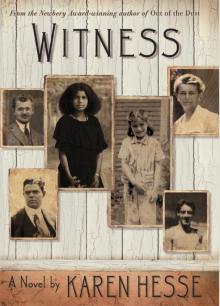 Witness
Witness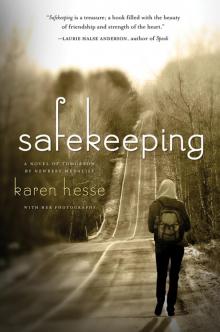 Safekeeping
Safekeeping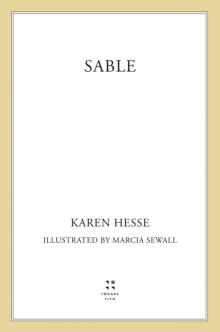 Sable
Sable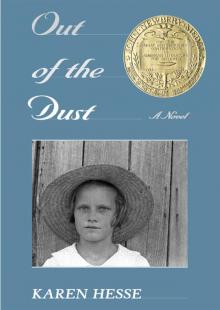 Out of the Dust
Out of the Dust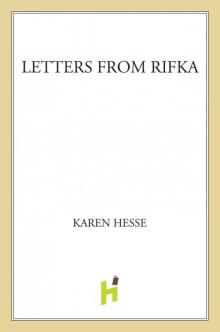 Letters From Rifka
Letters From Rifka The Music of Dolphins
The Music of Dolphins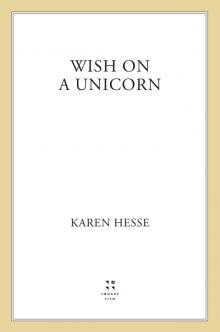 Wish on a Unicorn
Wish on a Unicorn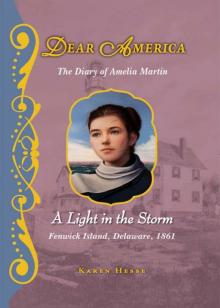 A Light in the Storm
A Light in the Storm